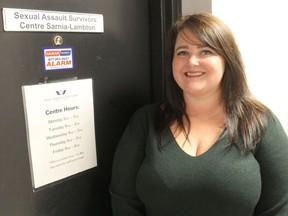Chantel Butterfield remembers being a teenager in an abusive relationship for more than seven years.

Chantel Butterfield remembers being a teenager in an abusive relationship for more than seven years.
Advertisement 2
Article content
“It was a boyfriend, and then his contacts or friends,” said the executive director of the Sexual Assault Survivors’ Center of Sarnia-Lambton, who’s the keynote speaker at a human trafficking awareness event happening March 1.
Article content
Butterfield said she recalled eventually coming to the center seeking help, and being inspired to pursue a career helping others who found themselves being exploited and abused.
“There are just things that I experienced in that intimate relationship that were not normal, they were not OK, and they were very coercive,” she said.
“They involved other people outside of my relationship that I didn’t consent to being involved or felt comfortable being with.”
Butterfield, who was wary about getting into details and who shared her story once before, years ago at a Sarnia Speaks event, said fundamentally her message is people need to feel safe to talk about intimate relationships.
Advertisement 3
Article content
“I think the conversations we don’t have with our youth are the reason that we have exploitation,” she said, arguing people let feelings of discomfort get in the way of talking about intimacy.
“When we can normalize having conversations about intimacy in all its forms, not just sex, I think we can hopefully start breaking down barriers and stigmas,” she said. “And then, when you’re in a situation as a youth when someone is coercing you into doing something you don’t want to do, and you have those feelings like ‘is this normal?’ you have someone in your life you can go to and ask that question.”
Human trafficking happens in Sarnia-Lambton, said Hunter Kameka, chair of the local Coalition Against Human Trafficking, and one of the event organizers along with the survivors’ center and Victim Services Sarnia-Lambton.
Advertisement 4
Article content
People tend to believe it doesn’t happen in Canada, or only happens in big cities, but that’s a false narrative that protects traffickers, she said.
“Unfortunately, as service providers, we are seeing it happening right here,” she said.
Speakers from the different agencies at the event will talk about what human trafficking is, and red flags people can look for, she said.
Victim Services personnel, “often first responders when there are calls of human trafficking,” also will talk about some of the trends they’re seeing, she said.
At the survivors’ center, people looking for help after experiencing trafficking are mostly teenagers, Butterfield said.
Help seekers often “are involved in those relationships that are seemingly related to domestic violence, but more coercive in nature and definitely on their way to being exploitative,” she said.
Advertisement 5
Article content
There’s been some increase in gang-related human trafficking activity, and — as people struggle with housing and homelessness — a significant increase in people being exploited for a safe place to sleep, she said.
National human trafficking awareness day is Feb. 22 and the agencies typically do something on or near the day to increase awareness, especially around the local impact, Kameka said.
There were 41 human-trafficking survivors who accessed survivors’ center services in 2021, Butterfield said. More up-to-date information wasn’t immediately available as the center is in the midst of moving downtownshe said.
The event is March 1, from 10:30 am to 3:30 pm at Aamjiwnaang First Nation’s Maawn Doosh Gumig Community and Youth Centre.
Tickets and more information are available at tinyurl.com/ypzxkurf.
Part of the proceeds help fund the survivors’ center, which receives about one-third of its total funding for its anti-human trafficking program, Butterfield said.
“And our client base is more than a third,” she said.
Article content